|
|
|
Sort Order |
|
|
|
Items / Page
|
|
|
|
|
|
|
| Srl | Item |
| 1 |
ID:
140993
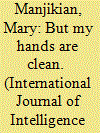

|
|
|
|
|
| Summary/Abstract |
Post-11 September 2001 (9/11) intelligence sharing has become more important than ever. Sharing arrangements have proliferated, involving additional types of organizations on all levels (local, state, national, and international), and more participants, including those from non-democratic regimes. The fight against terror has brought many new players together for the first time, united in combat against a common enemy. But since intelligence sharing arrangements are often informal and ad hoc, clear guidelines or common ground are seldom available in determining the rules governing such arrangements in the absence of shared norms and values on issues, including human rights, accountability, and transparency. That new controversies have arisen in the area of intelligence sharing is thus not surprising. Three specific ethical dilemmas involving intelligence sharing, have developed, among others, in recent years:
|
|
|
|
|
|
|
|
|
|
|
|
|
|
|
|
| 2 |
ID:
155029
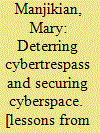

|
|
|
|
|
| Publication |
New Delhi, Alpha Editions, 2017.
|
| Description |
xiv, 65p.pbk
|
| Standard Number |
9789386780690
|
|
|
|
|
|
|
|
|
|
|
|
Copies: C:1/I:0,R:0,Q:0
Circulation
| Accession# | Call# | Current Location | Status | Policy | Location |
| 059184 | 005.8/MAN 059184 | Main | On Shelf | General | |
|
|
|
|
| 3 |
ID:
085266
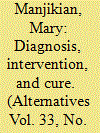

|
|
|
|
|
| Publication |
2008.
|
| Summary/Abstract |
Failed states discourse rests on an illness narrative. As the failing state battles against invasion by the terrorism "virus" the United State serves as physician, Diagnosing, trrating and sometime "curing" the patient.
|
|
|
|
|
|
|
|
|
|
|
|
|
|
|
|
| 4 |
ID:
122917
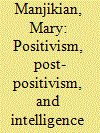

|
|
|
|
|
| Publication |
2013.
|
| Summary/Abstract |
In recent years, the Intelligence Community has been rather infatuated with positivist social science. Analysts like Stephen Marrin and Gregory Treverton have suggested that the best way for practitioners to reform intelligence analysis (and indeed the whole intelligence cycle) is to borrow positivist methodologies such as evidence-based practices and hypothesis testing from academic scientists and social scientists. Here, analysts seem particularly drawn to making analogies with the medical profession. The constraints which practitioners face and the methodologies they use in making an assessment or diagnosis are frequently compared. For example, Gary McClelland noted that:
Just as physicians often have to make quick assessment based on limited and sometimes conflicting information sources with no two cases ever being quite the same, so too intelligence analysts evaluate and characterize evolving situations using partial information from sources varying in credibility. 1
|
|
|
|
|
|
|
|
|
|
|
|
|
|
|
|
| 5 |
ID:
140497
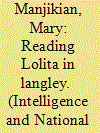

|
|
|
|
|
| Summary/Abstract |
Current methods of ascertaining the reliability of human intelligence focus predominantly on evaluating the reliability of sources. More leverage might be achieved through considering the reliability of narratives constructed or furnished by those sources. Lessons can be drawn from literary theory which examines the creation and reading of unreliable and untrustworthy narratives. A narrative can be unreliable and/or untrustworthy, even when the informant appears to be cooperating in furnishing information, due to his often unconscious biases or limitations in understanding or retelling the tale.
|
|
|
|
|
|
|
|
|
|
|
|
|
|
|
|
| 6 |
ID:
175597
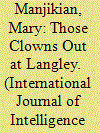

|
|
|
|
|
| Summary/Abstract |
In recent years, analysts and academics have noted the contentious relationship between the president and the Intelligence Community (IC). Press and media reports describing the difficult relationship between President Trump in particular and the IC often reference trust, characterizing relations as based on mutual distrust. In a 2017 interview, Jeffrey Counsel, former legal counsel at the Central Intelligence Agency (CIA), told reporter Judy Woodruff that he found Trump’s tweets about the IC “deeply disturbing and potentially very dangerous.” He noted that “They’re disturbing because he seems to be saying, I don’t trust the intelligence community.”
|
|
|
|
|
|
|
|
|
|
|
|
|
|
|
|
| 7 |
ID:
145588
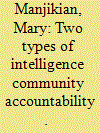

|
|
|
|
|
| Summary/Abstract |
Most academic writing on accountability in intelligence organizations presents a bureaucratic politics model which describes investigations and hearings as turf wars between competing organizations and interests. However, within public administration, a second model of organizational accountability exists. In this model, hearings and investigations are not wars over resources, but rather attempts to clarify the organization’s mission and identity. In analyzing transcripts from the 1975 Church Committee Hearings, we can find evidence that the investigation in fact included both types of accountability exercises. Hearings sought both to discipline wayward agencies and to help all parties understand the events which occurred and what these events meant for the identities of the agencies involved, within the context of a democratic society.
|
|
|
|
|
|
|
|
|
|
|
|
|
|
|
|
|
|
|
|
|